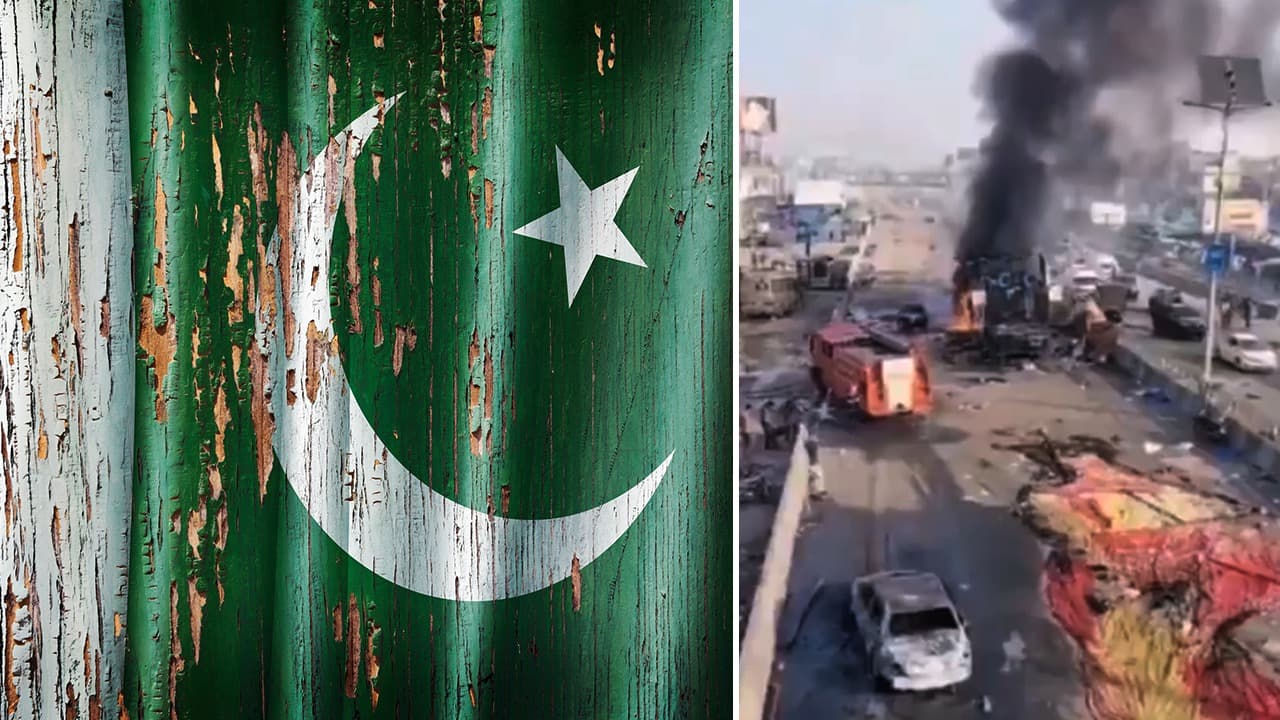Major General Sudhakar Jee warns that TLP, once army-backed, now poses a serious challenge to Pakistan’s fragile social fabric. Its violent protests, Sharia demands, and growing support risk tipping the country into deeper unrest.
New Delhi: Pakistan is confronting mounting internal and external pressures simultaneously, as far-right protests erupt at home while deadly clashes unfold along its border with Afghanistan. The country appears caught in a Catch-22, with its government and military trying cozy up with the United States even as domestic unrest challenges its authority.
Far-Right Protests Rock Punjab Province
In recent days, the Tehreek-e-Labbaik Pakistan (TLP), a far-right Islamist group, has led violent protests across Pakistan’s Punjab Province, resulting in dozens of deaths. The group’s leader, Saad Hussain Rizvi, was shot and wounded while leading a protest on October 14. Authorities have imposed internet blackouts in Lahore, Islamabad, and Rawalpindi to control the unrest.
Scroll to load tweet…
Speaking to Asianet Newsable English on this raging issues, Major General Sudhakar Jee (Retd), a geostrategic and security affairs expert, explained the dynamics behind the protests.
“TLP is a pro-Gaza and is protesting against Pakistan’s policy on Israel in Trump’s 20 Point peace proposal in Gaza. The outfit has evolved from a proxy backed by the establishment (Pakistan Army) against the mainstream parties to a full-fledged political force in its own right,” he noted.
TLP’s Genesis
Believed to have been created by the Pakistan Army, TLP was founded in 2015 by Khadim Hussain Rizvi with the aim of establishing a hardline Sharia-driven Islamic state.
“TLP was conceived to establish a hardline Sharia-driven Islamic state, catering to the country’s Sunni majority population in general and to the Barelvis in particular while targeting minorities such as the Ahmadiya, criticising the elite for abandoning Sharia and being overall critical of Western civilization with talking points against a supposed Jewish lobby as well as against leftist ideologies and secularism,” Major General Sudhakar Jee (Retd) said.
“TLP finds its sympathisers mainly among the Sunnis of Barelvi affiliation, who make the majority of Pakistan’s Muslim population, ranging from rural madrasa students to urban working professionals, such as in Karachi, where the city’s leadership and members include lawyers, doctors, chartered accountants and bank managers,” he added.
Scroll to load tweet…
TLP Poses Serious Challenge to Pakistan
TLP’s political influence has grown significantly. “Today, the TLP poses serious challenges to Pakistan’s long-standing, if fragile, pluralistic social norms and risks tipping the country into an even deadlier cycle of political radicalisation,” Sudhakar Jee said.
“It has become the 4th largest party in Pakistan following the 2024 Pakistan general election, securing nearly 2.9 million votes. TLP also became the 3rd largest party in the province of Punjab, Pakistan after receiving nearly 2.5 million votes in the 2024 Punjab provincial election. TLP currently holds one seat (PP-55 Narowal-II) in the Provincial Assembly of the Punjab,” the security expert added.
“TLP is known for its protests against any changes to the blasphemy law in Pakistan. It demands that Sharia be established as the Islamic law in Pakistan, through a gradual legal and political process. However, the TLP has repeatedly resorted to violent protests used to coerce the government into agreeing to their demands,” Sudhakar Jee concluded.
Scroll to load tweet…
Border Violence with Afghanistan Escalates
While the country grapples with internal unrest, violence has also intensified along Pakistan’s border with Afghanistan. Dozens of troops and civilians have been killed in the second week of clashes, triggered by explosions in Kabul blamed on Pakistan.
The Afghan Taliban launched offensives along southern and northwestern border points, prompting Pakistan to retaliate. Islamabad has accused Afghanistan of sheltering Tehreek-e-Taliban Pakistan (TTP) militants, a claim Kabul denies.
Pakistan’s military reported repelling attacks near Spin Boldak in southern Kandahar, killing around 20 Taliban fighters, with about 30 more casualties along the northwest border. The Afghan Taliban reported 15 civilian deaths and dozens wounded, claiming only a few of their fighters were killed.
A Nation Under Strain
Pakistan is facing simultaneous crises: violent street protests fueled by domestic Islamist politics, and deadly border skirmishes that threaten regional stability. These twin pressures highlight the fragility of Pakistan’s political and security environment, challenging its government and military to navigate both internal dissent and external threats.
